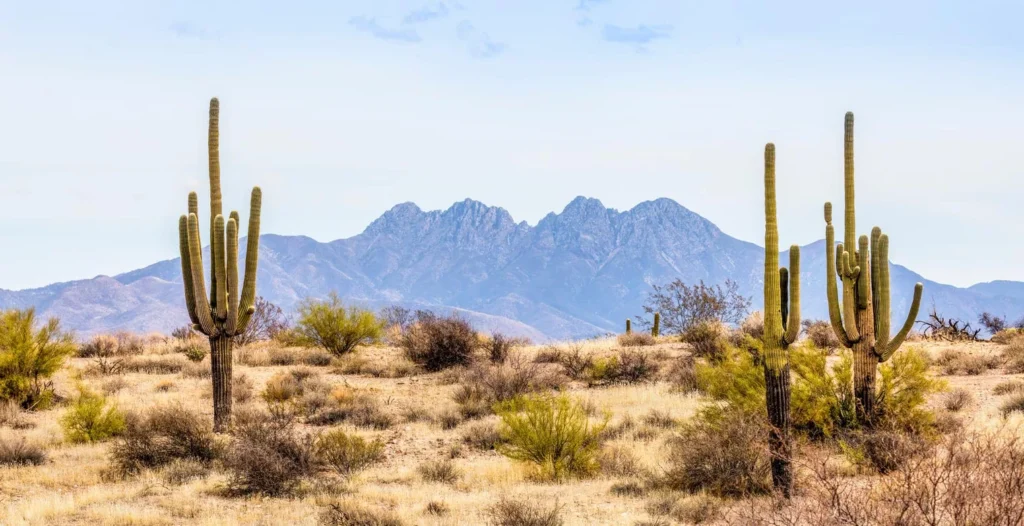Find Arizona Drug and Alcohol Treatment Centers
Table of Contents
- Find Arizona Drug and Alcohol Treatment Centers
- How to Find Addiction Treatment: Arizona
- Alcohol and Drug Addiction Rates In Arizona
- Traveling to Drug Rehab Centers in Arizona
- Finding Rehab Facilities in Arizona
- Arizona Is a Great Place to Be Sober
- What is the Cost of Arizona Rehab Centers?
- Alcohol Rehab Arizona and Drug Rehab Arizona Resources
- What are the Best Alcohol Rehab Centers in Arizona?
- The Benefits of Inpatient Drug Rehab Centers in Arizona
- Inpatient vs Outpatient Drug Rehab in Arizona
- Understanding Your Treatment Options
- Traveling to Arizona for Addiction Treatment
- How Long Does Recovering from Drug and Alcohol Addiction Take?
- Choosing Arizona Substance Abuse Treatment Centers
- Find a Top Arizona Addiction Treatment Center Quickly and Confidentially!
- Medically Reviewed By
In Arizona, 16.9 percent of the population used an illicit drug in the previous year, which is slightly higher than the national average of 14.7 percent. According to estimates, 10.2 percent of Arizona’s population has a substance use disorder, compared to 9 percent of the US population. If you or a loved one is in need of any variety of Arizona alcohol and drug rehab centers, this article will provide you with more information about your options across the state.
How to Find Addiction Treatment: Arizona
Arizona, located in the southwestern United States next to California, has a population of over 7 million people and more than 400 drug rehab centers for treating substance use disorders. The majority of these rehab facilities are in densely populated areas such as Phoenix and Tucson.
If you or a loved one is addicted to drugs or alcohol, you understand how difficult it can be to quit on your own. Inpatient rehab programs and facilities offer a safe way to get sober while also providing the focused support and resources required for long-term recovery.
Alcohol and Drug Addiction Rates In Arizona
In recent years, Arizona’s drug overdose rate has surpassed the national average. Local law enforcement agencies continue to face a difficult challenge as illicit drugs cross the border from Mexico into southern Arizona. Between 2013 and 2014, Arizona saw a 16% increase in pharmaceutical opioid and benzodiazepine-related deaths.
During the same time period, heroin-related deaths increased by 44%. Clearly, the need for drug rehab Arizona services is not going away any time soon, but fortunately, we can and will break down your best ways of choosing an Arizona treatment center campus that meets your needs.
The most commonly abused drugs in Arizona are as follows:
Marijuana, methamphetamine, and heroin are increasingly being smuggled into the United States near the Arizona border. Even though large amounts of marijuana have been seized while attempting to enter the state, trafficking remains a serious problem.
Heroin is another drug that is a problem in Arizona’s southern regions. Every year, as prescription medication regulations tighten across the country, the demand for heroin reaches new highs. Users can easily obtain the drug because it enters the state regularly.
Now, Arizona law enforcement is attempting to crack down on drug cartels smuggling low-cost heroin across the border. Other organizations have also stepped forward to raise awareness about the dangers of heroin to keep communities safe.
Traveling to Drug Rehab Centers in Arizona
Recovery is about new beginnings, where one embarks on a new path in life, shedding the dark shell of addiction. For some addicts and alcoholics who have struggled to achieve sobriety and/or clean time in their home city or state, the logical next step is to relocate to a new city or state. As a result, they are no longer exposed to the people, places, and things from their past. It’s a logical choice, and it happens all the time among those who can afford it.
Naturally, if you’re going to leave everything behind, a large number of addicts will choose a drug or alcohol rehab center in warmer climates as their recovery destination.
As evidenced by the exponential growth of addiction recovery facilities in those two states over the last two decades, California and Arizona are frequently at the top of people’s lists. What better place to emerge from the shadows of addiction and into the light of recovery than sunny Arizona?
The state is home to many reputable inpatient and outpatient treatment facilities, as well as a vast number of “sober living” homes. They were previously known as “halfway” homes because they are located between treatment and full autonomy.
Finding Rehab Facilities in Arizona
If you live in Arizona, there is a good chance that there is a sober living home in your neighborhood. Such facilities are typically large in size and can house up to ten people, all of whom are working toward the same common goal of recovery.
To be clear, sober living homes are not simply a collection of newly sober addicts and alcoholics. On-site supervisors keep an eye on the progress of those who live inside the house. The supervisor will ensure that everyone attends recovery meetings and keeps up with their daily responsibilities; this is done so that clients learn how to schedule their day-to-day activities, as idle time is well known to be a sure recipe for relapse.
Residents are drug tested at random to ensure they are not abusing drugs. If a person fails a drug test, they are typically sentenced to some form of probation, which could include leaving the house for a few days and returning only after passing another drug test.
Arizona Is a Great Place to Be Sober
Arizona is an excellent location to begin the next chapter of your sobriety journey. The “Grand Canyon State” is renowned for its stunning desert landscape, massive rock formations of rugged beauty, natural wonders across the state, a thriving artistic community, a sunny climate, and relaxing Southwestern culture.
Arizona is the type of place that is good for your physical and mental and emotional health. The variety of outdoor activities available in the state can help you regain physical strength and encourage you to get away from the hustle and bustle of everyday life.
Arizona’s 300 sunny days per year can help you avoid depression symptoms and improve your mood. There are many sober activities to enjoy in addition to the Grand Canyon and the state’s tranquil landscape.
You don’t need drugs or alcohol to have a good time. Instead, you can scuba dive, hike, swim, sail, or take a hot air balloon ride, with a foundation in recovery having been established with the help of drug and alcohol rehab in Arizona. Keep reading or call any time to get our help with finding the right match for you or your loved one, quickly and confidentially!
What is the Cost of Arizona Rehab Centers?
The majority of Arizona rehab facilities accept private insurance as well as state-funded plans. Many accept Medicare or Medicaid as well. Approximately 69 percent of Arizona rehab centers accept private insurance, including Kaiser Permanente, United Healthcare, and others.
People without insurance coverage, on the other hand, have other options for paying for drug rehab in Arizona. Approximately 86 percent of the state’s rehab centers accept self-pay, and 53 percent accept sliding scale fees, which means you pay what you can afford based on your income. Another 46% of Arizona facilities are covered by state-funded insurance.
The exact cost of Arizona drug addiction treatment varies depending on whether the patient requires short-term or long-term rehab, as well as the level of care required.
State-funded treatment facilities frequently have low to no out-of-pocket expenses, with AHCCCS Arizona drug rehab centers being among those subsidized by government funding.
Finding facilities that accept your insurance is a good place to start when looking for a treatment center. Then, choose a rehab center that meets your specific requirements.
When calculating the cost of rehabilitation in Arizona, consider the cost as an investment in your family’s future. Most treatment centers accept payment in part through your PPO or HMO plan. If you want to review your eligibility and the cost of treatment in Arizona, contact our team to get honest and up-to-date answers to your questions.
Alcohol Rehab Arizona and Drug Rehab Arizona Resources
Arizona has a diverse array of comprehensive recovery programs, which frequently include inpatient or outpatient rehab, dual diagnosis treatment for co-occurring disorders, addiction counseling, medication-assisted treatment, and support groups. These programs, when combined, offer the best chance for long-term sobriety to Arizona residents and visitors alike.
However, your preferred treatment may not be available in your state. Out-of-state treatment options have grown in popularity in recent years, and they have numerous advantages. Seeking a rehab program in a different state can help you avoid distractions and concentrate on improving your life.
Out-of-state facilities may even provide what you’re looking for in a treatment program and are tailored to your specific needs. It’s a chance to get a fresh start on your road to recovery from alcohol or drug use.
What are the Best Alcohol Rehab Centers in Arizona?
With regards to specific treatment centers and facilities in Arizona, many top facilities are depending on location. Some of those that have been given top rankings by their clients and form accredited options for those with private insurance policies include the venerable Sierra Tucson facilities in Tucson, Arizona, with a special focus on evidence-based treatment using the ‘Sierra Model,’ an approach they have honed over three decades in existence.
Despite the prestigious reputation of Sierra Tucson, a relative newcomer called Catalina Behavioral Health has been making strides in terms of providing acclaimed mental health treatment that also looks at mental health symptomology as the possible, underlying cause of many substance use disorders as well. These include co-occurring mental health issues and medical conditions.
If you are looking for a drug or alcohol rehab in Arizona, this center is a top contender for behavioral health services for a variety of reasons. While their facilities offer luxury and amenities that rival or even surpass Sierra Tucson, Catalina Behavioral Health and their acceptance of most major insurance policies ‘in network’ is something not offered by the larger and more well-known center in Tucson.
The Benefits of Inpatient Drug Rehab Centers in Arizona
One of the most important decisions you’ll have to make is whether to pursue an outpatient or inpatient treatment plan. While any treatment will help you to quit substances, inpatient treatments and residential detox centers have a higher success rate than outpatient treatments.
Choosing the best treatment for you is determined by factors such as the severity of your substance abuse issues, the length of time you have used drugs, the type of addiction you have, and your personality type. The following are some of the advantages of inpatient treatment in Arizona:
- Be able to treat withdrawal symptoms as they arise.
- Access to trained personnel 24 hours a day, seven days a week.
- Close attention to the detox phase.
- Extraction from a toxic environment.
- Removal of triggers discovered at home.
- Access to tailored mental health care.
- Availability of spiritual or holistic treatment methods.
- Access to drug addiction education.
Inpatient vs Outpatient Drug Rehab in Arizona
When attempting to get sober, the first few days are critical. Inpatient drug rehab is a great starting point for anyone looking to get sober. Going to inpatient programs removes the individual’s access to drugs and alcohol, allowing the individual to develop 30, 60, or even 90 days of clean time; inpatient rehab is recommended for individuals who do not have a strong support system or have a history of relapsing. This is why drug rehab centers in Arizona offer differing levels of quality care and evidence-based practices for their clients.
Outpatient drug rehab is available at a variety of locations, including clinics, healthcare providers’ offices, and local health departments. Outpatient rehab can be a blessing for someone who cannot be away from their jobs, school, or family obligations for months at a time; there are many outpatient substance use disorder treatment centers in Arizona, but it is often better to begin with inpatient treatment when possible.
Understanding Your Treatment Options
The main goal of Arizona rehab centers is to change your behavior and provide you with the knowledge and skills you need to avoid relapse once you complete the program.
According to the Substance Abuse and Mental Health Services Administration (SAMHSA), there are a variety of recovery tools and services available to those in need of addiction treatment. Your treatment will be determined by the program you select:
1. Dual diagnosis: Dual diagnosis rehabs work with people who have a mental health disorder as well as a substance use disorder. Physicians, social workers, hospitals, and clinics throughout the state can help you recover from both.
2. Holistic: Holistic treatment programs focus on healing the mind, body, and spirit from the effects of addiction. Meditation, deep breathing, massage, yoga, physical fitness, and other techniques are taught as stepping stones to sobriety.
3. 12 step program: The most well-known treatment method, which has helped thousands, if not millions, of people, get sober. The 12 Steps are a set of principles designed to assist people struggling with addiction in changing their beliefs. They work together to form a framework for long-term recovery.
4. Non-12 step: Do you want to achieve sobriety without following the structured path that AA follows? You might be interested in a program that isn’t based on the 12 steps. A non-12-step program, unlike Alcoholics Anonymous or Narcotics Anonymous, does not follow a stepwise plan to recovery and lacks the Higher Power that turns so many people away from the 12-step model.
Traveling to Arizona for Addiction Treatment
Traveling for drug and alcohol rehab treatment entails moving to Arizona or out of your hometown to enroll in a drug and alcohol rehab treatment facility, which provides the added benefit of a “fresh start.” It can be difficult for some people to resist temptations when they are constantly exposed to the same social circles in their hometowns that push them towards alcohol and drug addiction, which can hurt their recovery efforts.
Traveling to Arizona for treatment can form the best option, largely because it will remove them from the current environment of substance or alcohol misuse and allow a focus on treatment and overcoming challenges in a supportive environment.
One disadvantage is the brief period between leaving drug rehab facilities and returning to daily life. Individuals may face difficulties adjusting from a regimented environment to the various stimuli when they return to their families and jobs.
How Long Does Recovering from Drug and Alcohol Addiction Take?
The length of rehabilitation for a drug or alcohol use disorder is determined by a variety of factors. It all starts with the person, the type of addiction he or she has, and the severity of the addiction. Some substances may only necessitate outpatient treatment, which can be completed at home.
Others will require more personalized treatment and need to be admitted to a residential addiction recovery program for an inpatient stay. Addiction treatment in Arizona, like in most other states, ranges from short-term, one-month solutions to 120-day and even longer-term options. Speak with a counselor for more information on locating an addiction recovery clinic in Arizona for you or a loved one.
Choosing Arizona Substance Abuse Treatment Centers
Alcohol and drug rehab programs in Arizona can assist you or a loved one in overcoming addiction and resuming sobriety. Because there are so many facilities available, it’s critical to do your research and select a program that will specifically cater to your needs.
If you or a loved one is dealing with addiction or the aftereffects of substance abuse, please do not hesitate to contact Find Addiction Rehabs. You will have the opportunity to speak with one of our professionals who will assist you in locating the best rehabilitation options in your area.
The first step in the treatment process is to admit the problem before choosing an Arizona treatment center. Following that, the next step is to seek treatment. When compared to decades ago, there has been a significant increase in the number of rehabilitation centers in Arizona in recent years. Among the treatment options available are:
- Mental Health Centers
- Hospitals
- Self-help groups
- Private medical clinics
It is critical to seek assistance, but it is even more critical to seek the appropriate type of treatment. People frequently use a variety of types during the course of treatment. For example, some people may begin their detox in a rehab or inpatient facility, progress to outpatient rehabilitation treatment, and then transition to self-help groups or ongoing counseling.
When seeking treatment and trying to determine the best type of care for overcoming one’s drug or alcohol abuse, each seeker must compare various organizations and facilities to determine the most appropriate setting for addressing the problem.
Find a Top Arizona Addiction Treatment Center Quickly and Confidentially!
Although the process of locating the best treatment options for yourself or your loved one can certainly seem daunting, we hope our comprehensive review of the features of Arizona alcohol and drug rehab centers has proved useful to your search. And, if at any time you need assistance in getting the top options available to you, please don’t hesitate to reach out to the compassionate admissions team and recovery reps right here at Find Addiction Rehabs.
We work with an extensive network of drug-alcohol rehab centers nationwide that can provide a clinical and holistic approach to treatment, so that all of your recovery needs are covered. We’re ready and waiting for the call that can help your recovery journey get started!
Eric R. hails from Maine and does extensive work in the field of behavioral health as both a professional writer and passionate advocate for those suffering. From his own personal encounters with mental illness, he speaks to those seeking healthy relief from depression and anxiety and embraces wellness both personally and professionally. After losing friends and family to the darkness of suicide, Eric aims to educate and inform about the nature of treatment and render it accessible for all those seeking a way out of darkness and despair.







